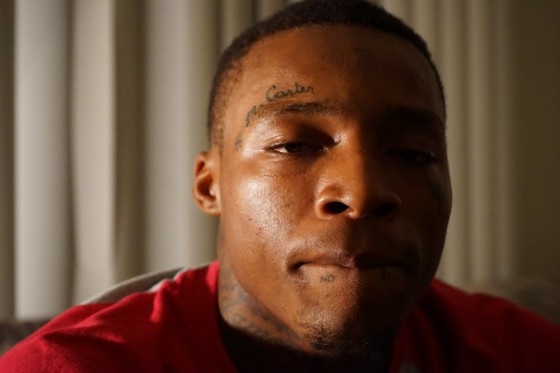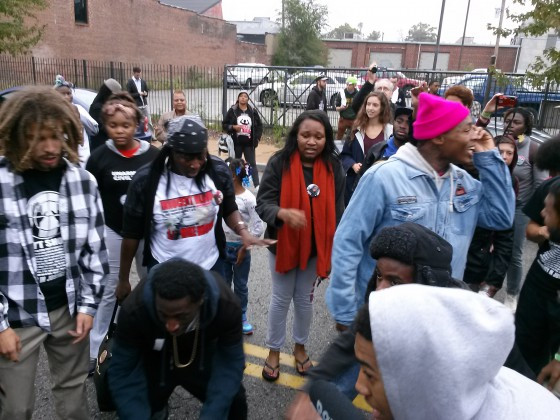
Dontey Carter was holding forth at the memorial site for Vonderrit Myers Jr., the south St. Louis teen who was recently shot and killed by police under dubious circumstances. There were some 200 people gathered around him, joined in a silent circle. The community was still reeling from the shooting death of teenager Michael Brown, just two months earlier.
Carter was not intimidated by the silence of the others around him. He spoke openly and loudly to a handful of mourners, delivering an impassioned discourse about the injustices that African Americans routinely face in the city. The treble and volume in his voice betrayed his emotional state; tears streamed down his face in the dark. Some people in the circle tried to quiet him, which only made him talk louder. Carter made his way to the center of the circle and turned the moment of silence into a call for action.
Twenty minutes later, the young activist was leading the crowd uphill in a march towards a line of waiting police.
“I don’t wanna be a leader, but this is probably a road that was meant for me,” Carter told Fusion a few days later at his home in Spanish Lake, in northern St. Louis County. “I figure I need to find some way to stop this violence before it reaches my children and my nieces and nephews.”

Photo/ Daniel Rivero
As a heavily tattooed 23-year-old black high school dropout, Carter doesn’t seem to fit the old mold of civil rights advocates, many of whom belong to an aging cadre of Washington-based men in suits. Carter grew up in the foster care system, surrounded by people who got locked up, including his 21-year-old brother who he says was sentenced to 37 years in prison for an unspecified crime.
“You gotta understand that that’s where my mind is at,” he said, slumped into his couch. “People hanging around all day kickin’ and jammin’, getting high and f**king-up. Yeah, I used to be that, but now we got bigger issues. We can’t leave it to nobody else to fix our situation.”
That includes the old guard from the civil rights movement in the 1960s.
Young St.Louis activists recently challenged National Association for the Advancement of Colored People (NAACP) president Cornell William Brooks by turning their back on him during an Oct. 12 speech.
Now there appears to be a new generation coming forward, led by a new wave of self-styled activists such as Carter .
“You’re 50 years old and I’m 23 years old. Your lifestyle and the way you grew up is different from the way I grew up,” Carter says of the older civil rights leaders. “All of these organizations never had to deal with young people that’s 14, 15 years old catching gun charges, catching bodies, not to mention the whole drug war, that is locking us up from when we children.”
He adds, “Things different now, so we gotta react different.
Like, they say we don’t get permits when we out there protesting. Shit, we don’t care about a permit.
People are dying. You think I wanna be getting a permit?”
Carter brought his contagious energy to this month’s protests in St. Louis. He bounced between groups and amped the crowd’s energy level. Under his orchestration, the massive protests almost had the feel of a block party. But it was more of an awakening than a party, the young activist says.
“People might say we out there partying— naw. We actually out there having a celebration because people are coming home, people are waking up,” he said. “Least we can do it is make it catchy, keep the energy high.”

Twenty three year old Carter, in a pink beanie, whips up a spontaneous rally in St. Louis on Oct. 12. Photo/ Daniel Rivero
When Brown was shot on Aug. 9, Carter says he went to Ferguson to check out the protest. He had no intention of becoming such an enthusiastic booster, but got swept up in the energy of the moment.
“I just showed up and people was chanting together. And so I chanted, and started making some different chants,” he said. “And I went to a bigger crowd and the same thing. It was a natural, spiritual thing to me to just keep doing this.”
That initial taste of protest turned out to be a gamechanger for Carter and his friends. The group of newly minted activists began camping out behind an abandoned building on W. Florissant Avenue in Ferguson. They started calling themselves “Lost Voices,” a loosely assembled group of 10 social organizers who aim to become the new standard bearers of the civil rights movement by addressing how police and the black community interact with one another. The group is at the center of the ongoing protests and calls for social justice that echo through the St. Louis night.
“How I see it, first we was slaves. Then they brought the separate-but-equal.
And now what they did is end that, but we still got this prison system, this police state making all of us criminals for the smallest shit."
“This whole thing with Mike Brown getting killed, it comes from that.”
Now that it’s started, it’s not going to stop, Carter says.
“Now we got people coming down here from out of town and saying, ‘I don’t wanna leave. I wanna stay here,’ like it’s sacred ground,” he said.
“People chasing it like a high,” he said. “This thing called freedom.”
This piece was originally published by Fusion.net.
Share +
- Share St. Louis, Not Asking For Permission: The New Face of Activism on Facebook
- Tweet St. Louis, Not Asking For Permission: The New Face of Activism!
- Share St. Louis, Not Asking For Permission: The New Face of Activism on Google +
- Reddit St. Louis, Not Asking For Permission: The New Face of Activism!

